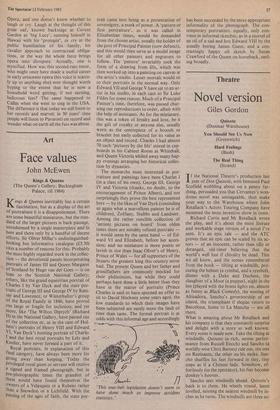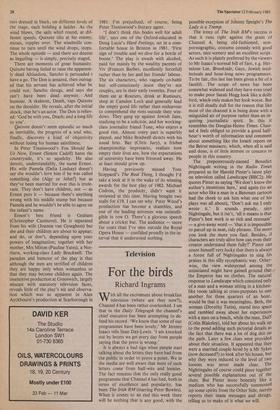Theatre
Novel version
Giles Gordon
Quixote (Donmar Warehouse) You Should See Us Now (Greenwich) Hard Feelings (Bush) The Real Thing (Strand)
If the National Theatre's production last year of Don Quixote, with bemused Paul Scofield wobbling about on a penny far- thing, persuaded you that Cervantes's won- drous novel was unstageable, then make your way to the Warehouse where John Retallack's Actors Touring Company have mounted the most inventive show in town.
Richard Curtis and Mr Retallack wrote the play, and it's about the most literate and workable stage version of a novel I've seen. It's an epic tale — and the ATC proves that an epic can be scaled by six ac- tors — of an innocent, rather than silly or deranged, old-timer believing that the world's well lost if chivalry be dead. This we all know, and the scenes remembered from the book — tilting at windmills, pro- curing the helmet (a cymbal, and a symbol), dinner with a Duke and Duchess, the slaughter of a Moor (a puppet), night in the inn (played with the house lights on, almost as funny as Black Comedy), the wooing of Altisadora, Sancho's governorship of an island, the triumphant if elegiac return to Barcelona, home to La Mancha — are all there.
What is amazing about Mr Retallack and his company is that they constantly surprise and delight with a story so well known. Every scene is made new. Take the tilting at windmills. Quixote (a rich, serene perfor- mance from Russell Enoch) and Sancho (a worldly-wise Chris Barnes) ride out, the one on Rozinante, the other on his moke. San- cho shuffles his feet forward in tiny, tiny steps as if a Chinese lady. Somehow, ef- fortlessly (to the spectator), his feet become
/7 donkey's hooves.
Sancho sees windmills ahead. Quixote's back is to them. He wheels round, lance levelled, missing the nearest windmill by in- ches as he turns. The windmills are three ac- tors dressed in black, on different levels of the stage, each holding a ladder. As the wind blows, the sails whirl round, at dif- ferent speeds. Quixote tilts at his enemy, misses, topples over. The windmills con- tinue to turn until the wind drops, stops. The whole episode — and there are dozens as beguiling — is simply, precisely staged.
There are moments of great humanity. Quixote having failed to raise the apparent- ly dead Altisadora, Sancho is persuaded t have a go. The Don is amazed, then outrag- ed that his servant has achieved what he could not. Sancho shrugs, and says she can't have been dead anyway. And humour. A skeleton, Death, taps Quixote on the shoulder. He reveals, after the initial shock, that he's an actor. The Don is reliev- ed: 'God be with you, Death; and a long life to you'.
Quixote doesn't seem episodic so much as inevitable, the progress of a soul who, finally, discovers a kind of objectivity without losing his human saintliness.
In Peter Tinniswood's You Should See Us Now, Ernest (Simon Cadell) hates the countryside, it's so squelchy. He also detests, understandably, the name Ernest. His wife Pamela (Delia Lindsay) doesn't say she wouldn't love him if he was called something else (Algy or John?) but as they've been married for ever this is irrele- vant. They don't have children, not — as Ernest puts it — because there's anything wrong with his middle stump but because Pamela and he wouldn't be able to agree on the infant's name.
Ernest's best friend is Graham (Christopher Cazenove). He is separated from his wife (Joanna van Gyseghem) but she and their children are about to appear; and do, or don't, depending upon your powers of imagination; together with her mother, Mrs Mitten (Pauline Yates), a Nor- thern, working-class Lady Bracknell. The paradox and humour of the play is that although the men are terrified of children they are happy only when wornanless so that they may become children again. The insensitive production at Greenwich, largely miscast with statutory television faces, reveals little of the play's wit and observa- tion which was so apparent in Alan Ayckbourn's production at Scarborough in 1981. I'm prejudiced, of course, being Peter Tinniswood's literary agent.
'I don't think this bodes well for adult life', says one of the Oxford-educated in Doug Lucie's Hard Feelings, set in a com- fortable house in Brixton in 1981. 'First sign of trouble and we dive for a bottle of booze.' The play is awash with alcohol, paid for mainly by the wealthy parents of Viv (Frances Barber, excellently forceful) rather than by her and her friends' labour. The six characters, who vaguely co-habit but self-consciously insist they're not couples, are in their early twenties. Four of them eat at Routiers, drink at Rumours, shop at Camden Lock and generally lead the empty good life rather than endeavour to comprehend the riots outside their win- dows. They gang up against Jewish Jane, studying to be a solicitor, and her working- class journalist friend Tone, who enjoys a good riot. Almost every part is superbly played, and Mike Bradwell directs with his usual brio. Baz (Chris Jury), a frisbee championship impresario, realises how empty their lives are, how the expectations of university have been frittered away. He at least should grow up.
Having previously missed Tom Stoppard's The Real Thing, I thought I'd take a look at it in the wake of its winning awards for the best play of 1982. Michael Codron, the producer, didn't want it reviewed at this time. Having bought two stalls for £19, I can see why. Peter Wood's production has become a shambles, and one of the leading actresses was unintelli- gible in row 0. There's a glorious speech about a cricket bat. The audience — more fur coats than I've seen outside the Royal Opera House — confided proudly in the in- terval that it understood nothing.







































 Previous page
Previous page